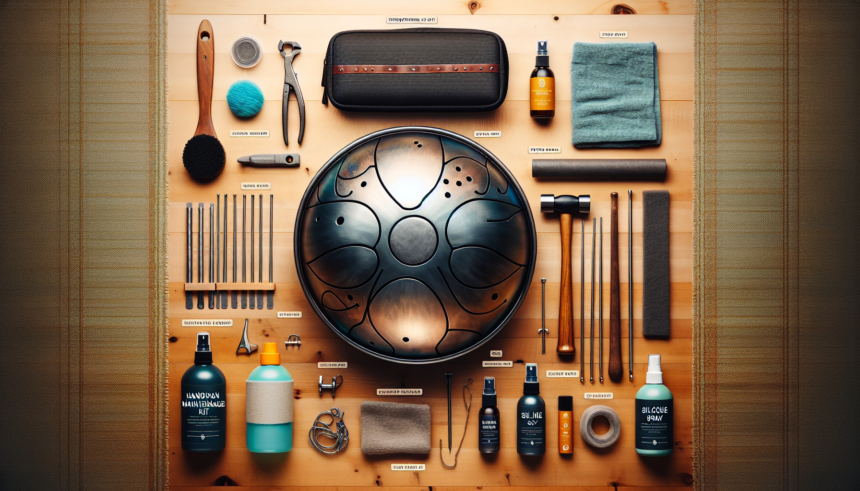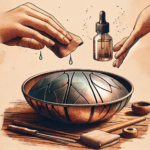Handpans are beautiful musical instruments that produce ethereal and captivating sounds. However, like any other instrument, they require regular maintenance to ensure their longevity and optimal performance. Building the ultimate handpan maintenance kit can save you time and money, and keep your beloved instrument in pristine condition. Below, we discuss the essential items to include in your handpan maintenance kit, how to use them, and some tips to extend the life of your handpan.
Essential Items for Your Handpan Maintenance Kit
1. Microfiber Cloths
Microfiber cloths are crucial for cleaning your handpan without scratching its surface. They are soft, absorbent, and perfect for wiping away dust, fingerprints, and other contaminants. Always have a few microfiber cloths in your maintenance kit for routine cleaning.
2. Rubbing Alcohol
Rubbing alcohol is excellent for removing oils and grime from the surface of your handpan. It evaporates quickly without leaving residue. Ensure you use isopropyl alcohol with a high concentration (70-90%) for the best results.
3. Protective Oil
Handpans can be susceptible to rust, especially if they come into contact with moisture. Protective oils, such as Frog Lube, Phoenix Oil, or Ballistol, create a barrier that prevents rust formation. Apply a thin layer of oil after cleaning with rubbing alcohol to protect your instrument.
4. Soft Brushes
Soft brushes can help remove particles and debris lodged in the intricacies of your handpan. Brushes with natural bristles are preferable, as they are gentle on the surface but effective in cleaning.
5. Saddle Rash Guard
A saddle rash guard can prevent wear and tear when playing the handpan on your lap. It is a cushioned pad that provides a protective layer between your lap and the handpan, reducing friction and potential scratches.
Additional Handy Tools
6. Tuning Hammer
If you have experience tuning your handpan or prefer to fine-tune your instrument, a tuning hammer is an essential tool. It allows precise adjustments to ensure each note sounds perfect. However, be cautious and consider seeking professional help if you’re unfamiliar with handpan tuning.
7. Digital Tuner
A digital tuner can be incredibly helpful in maintaining the correct pitch of your handpan. It provides real-time feedback and helps you identify notes that need tuning or adjustments.
8. Humidifier Packs
Handpans can be affected by changes in humidity, which in turn can impact their tuning and overall performance. Humidifier packs help maintain a stable environment for your handpan. Place them inside the case or storage bag to regulate humidity levels.
9. Handpan Case or Bag
Investing in a high-quality handpan case or bag is crucial for transport and storage. Look for cases with ample padding and a sturdy structure to prevent damage during transit. A proper storage solution also protects your handpan from dust and accidental impacts.
How to Use Your Maintenance Kit
Cleaning
Regular cleaning is essential to keep your handpan sounding and looking its best. Use your microfiber cloth to wipe down the surface after each use. For a more thorough cleaning, dampen the cloth with a small amount of rubbing alcohol and gently clean the entire surface. Avoid using excessive alcohol, as it can damage the steel.
Oiling
After cleaning, use your protective oil to apply a thin, even layer over the surface of the handpan. This helps to prevent rust and extends the life of the instrument. Use a clean microfiber cloth or your hands to apply the oil, ensuring it’s spread evenly.
Tuning
If you’re using a tuning hammer and digital tuner, only make small adjustments. Tuning requires a delicate touch and precision. Strike the areas needing adjustment gently and check the pitch frequently with the digital tuner. Only experienced players should attempt this, as improper tuning can damage the handpan.
Storage and Transport
Always store your handpan in its case or bag when not in use. If you live in a humid area, use humidifier packs to control the environment inside the case. For transport, ensure the handpan is securely placed in its case to prevent movement and potential damage.
Additional Tips for Handpan Maintenance
Avoid Extreme Temperatures
Keep your handpan away from extreme temperatures, as both heat and cold can affect its tuning and structural integrity. Avoid leaving it in a car, near heaters, or in direct sunlight for extended periods.
Handle With Care
Always handle your handpan with care. Avoid placing heavy objects on it or dropping it, as significant impacts can cause dents and affect the sound quality.
Regular Inspections
Regularly inspect your handpan for any signs of rust, dents, or other damages. Addressing minor issues early can prevent them from becoming major problems later on.
Seek Professional Help When Needed
If you’re unsure about any aspect of your handpan’s maintenance, don’t hesitate to seek professional help. Expert tuners and repair technicians can provide valuable assistance and ensure your instrument remains in top condition.
Conclusion
Building the ultimate handpan maintenance kit is an investment in the longevity and performance of your cherished instrument. By including essential items like microfiber cloths, rubbing alcohol, protective oil, and additional tools such as a digital tuner and humidifier packs, you can maintain your handpan’s pristine condition for years to come. Remember to handle your handpan with care, avoid extreme temperatures, and seek professional help when needed. With proper maintenance, your handpan will continue to produce beautiful, mesmerizing sounds, enriching your musical journey.
FAQs
1. How often should I clean my handpan?
It’s recommended to wipe down your handpan with a microfiber cloth after each use. For thorough cleaning with rubbing alcohol and oiling, doing it once a month should be sufficient unless you play extensively.
2. Can I use any oil for my handpan?
No, it’s best to use oils specifically designed for handpans or similar instruments. Options like Frog Lube, Phoenix Oil, or Ballistol are popular choices. Avoid using cooking oils or other non-specific oils as they may not provide the same level of protection and can go rancid over time.
3. Is it safe to tune my handpan myself?
Tuning a handpan requires a delicate touch and precision. If you’re not experienced or confident, it’s best to seek professional tuning services. Improper tuning can damage the instrument’s tone fields and overall sound quality.
4. How do I prevent rust on my handpan?
Regularly applying a thin layer of protective oil after cleaning with rubbing alcohol can prevent rust. It’s also crucial to store your handpan in a dry environment and avoid exposure to moisture.
5. What should I do if I notice a dent in my handpan?
If you notice a dent in your handpan, it’s best to consult a professional handpan tuner or repair technician. Attempting to fix the dent yourself can lead to further damage and impact the sound quality of the instrument.






